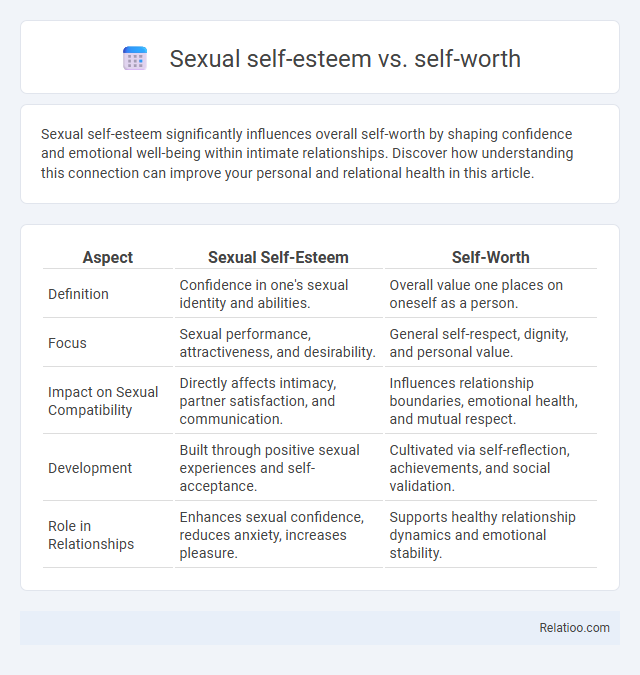Sexual self-esteem significantly influences overall self-worth by shaping confidence and emotional well-being within intimate relationships. Discover how understanding this connection can improve your personal and relational health in this article.
Table of Comparison
| Aspect | Sexual Self-Esteem | Self-Worth |
|---|---|---|
| Definition | Confidence in one's sexual identity and abilities. | Overall value one places on oneself as a person. |
| Focus | Sexual performance, attractiveness, and desirability. | General self-respect, dignity, and personal value. |
| Impact on Sexual Compatibility | Directly affects intimacy, partner satisfaction, and communication. | Influences relationship boundaries, emotional health, and mutual respect. |
| Development | Built through positive sexual experiences and self-acceptance. | Cultivated via self-reflection, achievements, and social validation. |
| Role in Relationships | Enhances sexual confidence, reduces anxiety, increases pleasure. | Supports healthy relationship dynamics and emotional stability. |
Defining Sexual Self-Esteem and Self-Worth
Sexual self-esteem refers to an individual's confidence and positive perception of their own sexual identity, desires, and abilities, influencing intimate relationships and overall well-being. Self-worth encompasses a broader sense of personal value and self-respect that affects all aspects of life, including but not limited to sexuality. Defining sexual self-esteem involves recognizing it as a component of self-worth specifically tied to one's sexual experiences and body image, distinct yet interconnected with general self-esteem.
The Interconnection Between Sexual Self-Esteem and Self-Worth
Sexual self-esteem directly influences your overall self-worth, as positive perceptions of your sexual identity enhance confidence and emotional well-being. High sexual self-esteem fosters a healthier self-image, reinforcing feelings of value and respect across all areas of life. Understanding this interconnection helps in developing a balanced sense of self that integrates sexuality with personal worth.
Psychological Factors Shaping Sexual Self-Esteem
Psychological factors shaping sexual self-esteem include past experiences, body image, and emotional intimacy, all of which deeply impact your self-worth and confidence in sexual contexts. Sexual self-esteem reflects how you value yourself as a sexual being, influenced by internal beliefs and external feedback from relationships. Understanding the distinction between sexual self-esteem and overall self-worth helps identify targeted strategies for improving mental and emotional health in your sexual life.
Societal Influences on Self-Worth and Sexual Perception
Societal influences shape your sexual self-esteem by dictating norms, ideals, and expectations that impact how you perceive your sexual worth and identity. Media portrayals and cultural standards often reinforce narrow definitions of attractiveness and desirability, directly affecting both self-worth and sexual self-perception. Understanding these external pressures allows you to critically evaluate and strengthen your self-esteem separate from societal judgments.
Common Misconceptions About Sexual Self-Esteem
Sexual self-esteem is often confused with self-worth, but it specifically relates to how you perceive your sexual value and confidence rather than your overall sense of personal value or competence. Common misconceptions about sexual self-esteem include believing it solely depends on sexual performance or physical appearance, while it actually encompasses emotional comfort, boundaries, and self-acceptance in intimate situations. Understanding these distinctions helps improve your sexual well-being and fosters healthier relationships grounded in respect and authentic connection.
Impact of Low Sexual Self-Esteem on Relationships
Low sexual self-esteem can significantly undermine intimacy and communication within relationships, often leading to increased anxiety, reduced sexual satisfaction, and emotional distance between partners. This diminished confidence in one's sexual identity or abilities can create feelings of inadequacy and insecurity, negatively affecting overall relationship quality and stability. Addressing sexual self-esteem is crucial for fostering healthy emotional connections and improving mutual trust and affection in committed partnerships.
Building Healthy Sexual Self-Esteem
Building healthy sexual self-esteem involves recognizing your intrinsic value beyond physical appearance or sexual performance, which directly enhances your overall self-worth. Understanding the difference between sexual self-esteem and self-worth allows you to cultivate confidence in your sexuality without tying it solely to external validation or specific sexual experiences. Prioritizing open communication, self-acceptance, and respect for your boundaries strengthens your sexual self-esteem and fosters a more positive, integrated sense of self.
Strategies to Strengthen Overall Self-Worth
Strategies to strengthen overall self-worth include practicing self-compassion, setting healthy boundaries, and engaging in positive self-talk to reshape negative beliefs. Developing sexual self-esteem involves embracing body positivity, communicating openly about desires, and challenging societal stigmas related to sexuality. Aligning sexual self-esteem with broader self-worth enhances emotional resilience, promotes authentic relationships, and fosters a holistic sense of personal value.
Overcoming Shame and Stigma Around Sexuality
Overcoming shame and stigma around sexuality involves distinguishing sexual self-esteem from overall self-worth; sexual self-esteem specifically relates to confidence and comfort with one's sexual identity and experiences, while self-worth encompasses a broader sense of value as a person. Building sexual self-esteem requires addressing internalized negative beliefs and societal taboos through education, open communication, and supportive environments. Enhancing both sexual self-esteem and self-worth fosters healthier sexual expression and reduces feelings of shame linked to sexuality.
Embracing Sexual Self-Acceptance for Holistic Well-Being
Sexual self-esteem reflects confidence and comfort with one's sexual identity and experiences, while self-worth encompasses an overall sense of value extending beyond sexuality. Embracing sexual self-acceptance involves recognizing and honoring personal desires, boundaries, and imperfections, which fosters mental and emotional well-being. Integrating sexual self-esteem into broader self-worth contributes to holistic well-being by promoting authenticity, reducing shame, and enhancing intimate relationships.

Infographic: Sexual self-esteem vs self-worth
 relatioo.com
relatioo.com